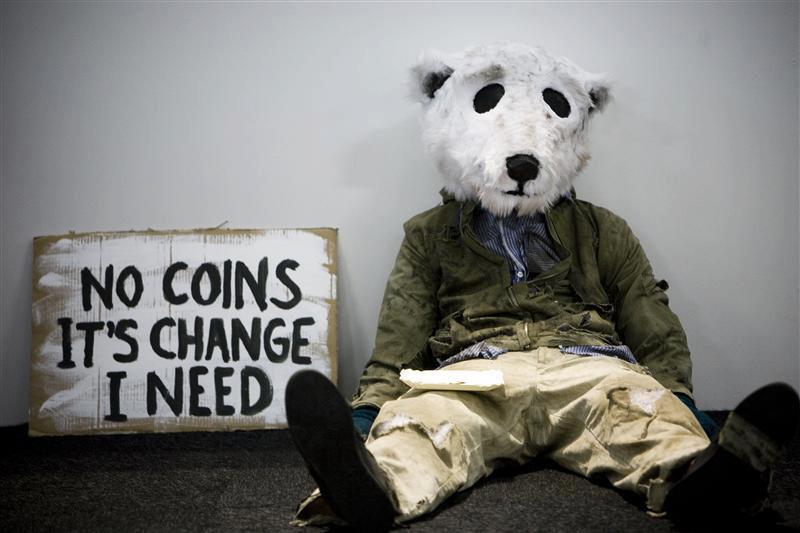Everyone from the fossil fuel industry to Greenpeace’s own Executive Director, Kumi Naidoo, has conceded Rio + 20 was a total waste of space. Naidoo’s take on it was pretty simple: ”Rio has turned into an epic failure. It has failed on equity, failed on ecology and failed on economy.” Apart from that it was a raging success.

After 20 years of these international forums and a million Conference of the Parties (COP) to discuss the world’s response to climate change the evidence tells us they do not work. That is, if by “work” we mean achieving better outcomes for bio-diversity, cleaner and more resilient oceans, lower carbon emissions and a more equitable distribution of the world’s resources, none of that has been achieved. In fact all of those indicators, especially carbon emissions, are a lot worse than they were 20 years ago.
There are numerous arguments about why the vitally needed change has not occurred. Certainly the power of the fossil fuel industry across the world and the scale of change required are two good places to start. But considering the impact of a warming planet and the collapse of the oceans at a time when the world’s population is on track to reach 9 billion by 2050, the question needs further investigation.
I want to suggest two reasons that have so far remained unexplored in any meaningful way. The first is that as all the global indicators get worse, we in the West feel better. And secondly, we continue to reassure ourselves that should change be required, slow and steady – not to say measured and reasonable – will be just fine.
First, to the problem of feeling good.
Jeffrey Sachs said in an opinion piece he wrote for the Financial Times in Germany; “We need to recognize that with 7 billion people today, and 9 billion by mid-century, all inter-connected in a high-tech, energy-intensive global economy, our collective capacity to destroy the planet’s life-support systems is unprecedented. Yet the consequences of our individual actions are typically so far removed from our daily awareness that we can go right over the cliff without even knowing it.”
With apologises to those with a weak stomach, let me explain why pain is such a beautiful thing. A dear friend of mine use to have a huge appetite for narcotics that eventually cost him his index finger. As he explained it to me he had gone on a binge and remained seriously stoned for a few days and unfortunately he had burned his finger very badly with a cigarette. But because he was so out of it he didn’t actually feel any pain and so did not go for help and so did not notice that the finger was rotting. By the time he straightened up sufficiently to feel the pain his finger had to be taken off to stop the gangrene that had taken hold.
Feeling the pain of that burn would have prevented him from losing his finger and potentially his life. Pain really is a sign that something is wrong.
But we in the West continue to be insulated from the pain caused by our consumption. Sure I know energy created by burning coal, oil or gas is driving global warming. But when I turn on the clothes drier, TV, radio, computer or heater I don’t see that impact. But I do get dry clothes, entertainment, music and information – it’s all good news from where I stand.
We are so far, so removed from the impact of our over-consumption of non-renewable resources – including fossil fuels – that we are unlikely to start feeling any real pain until it is too late. That is, until the climate has reached any number of tipping points beyond which we may lose control over global warming.
Then there’s the problem we have understanding the nature of collapse.
Last week we saw just how quickly apparently stable structures could be reduced to near smoking ruin within weeks.
Journalists, investors and media junkies have known for years that the business model underpinning Australia’s mainstream media organisations was broken. Despite millions of column inches written on it nothing much was done about it. There was a sense that something would have to be done about “it” one day and an assumption that that would happen in a nice – or at least – predictable fashion.
Well last week something was done in form of 1,900 workers losing their jobs over the next couple of years, heiress Rinehart buying up close to 20% of Fairfax and refusing to respect editorial independence and News Limited looking at re-tooling itself with hundreds if not thousands of workers being laid off.
Mainstream media in Australia will never be the same after last week.
Ask any former Emperor, super-power or Australian journalist and they will tell you that collapse, when it comes, comes swiftly. It is not a nice well behaved creature that presents predictable options and it rarely comes from single sources. As the story of both Fairfax and News demonstrate, change can come from multiple and amplifying drivers.
All the reports and warnings put out by the United Nations and any number of global scientific organisations and welfare agencies have told us time and time again that our behaviour is pushing our environment and the creatures that inhabit it to the very edge of viable.
We are currently in the privileged position of knowing what our behaviour will do and almost when it will do. Few people have ever been so fortunate. A failure to imagine the pain already being felt by others and a belief in the predictable and manageable nature of change will see us waste this one great opportunity.
It may not be more international talkfests that are needed. It may be that we all need new ways of imagining and a new appreciation and respect for the crisis we confront.
Macken Sense is a weekly metabolic breakdown of media and green events by our astute commentator, Julie Macken. Follow Julie Macken on Twitter @juliemacken

